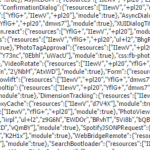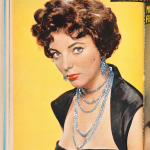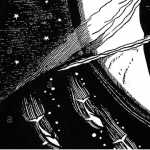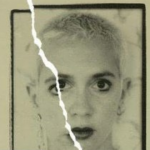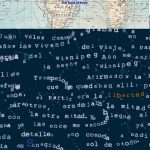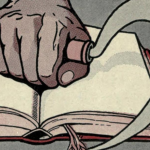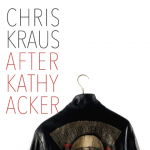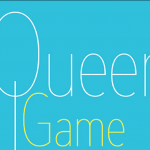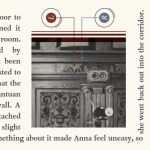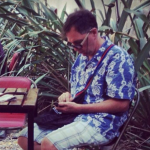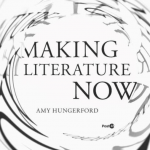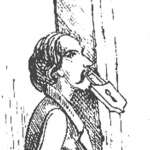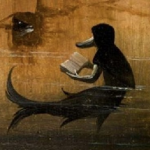Creating New Constraints: Toward a Theory of Writing as Digital Translation
Jan BaetensIn response to Mencia, Pold, and Portela, Belgian poet and scholar Jan Baetans suggests that we might view the field of trans-medial literature as an offshoot of translation studies (and not the reverse). In any case, whether we approach e-lit from a medial or linguistic standpoint, scholars do well to observe a "merger of translation and adaptation studies."
Photo Narratives and Digital Archives; or: The Film Photo Novel Lost and Found
Jan BaetensA first draft of this essay was presented at the 2017 ELO Conference at Porto, in a panel organized by the "Nar-Trans" group of the University of Granada.
Vibrant Wreckage: Salvation and New Materialism in Moby-Dick and Ambient Parking Lot
Dale EnggassInstead of simply reviewing Vibrant Matter by Jane Bennett (Duke 2010), author Dale Enggass applies Bennett's "Political Ecology of Things" to longstanding (and not yet resolved) themes of salvation, materialism and transcendence in Melville's Moby-Dick and Pamela Lu's Ambient Parking Lot.
Decollage of an Iconic Image
Daniel SchulzEven as the first biography of Kathy Acker appears, we have word of a newly assembled Acker archive in Cologne, under the curatorship of Daniel Schulz. The gist of which, could be to re-orient Acker's personal relationships to "the politics inherent in Acker's life."
Electronic Literature Translation: Translation as Process, Experience and Mediation
Søren Bro Pold, María Mencía, Manuel Portela"[T]ranslation is merely a preliminary way of coming to terms with the foreignness of languages to each other." (Walter Benjamin, "The Task of the Translator" [1921])
Self-Aware Self-Censorship As Form
David Thomas Henry WrightA dedicated, elaborated thought stream from an author who, like McElroy, has read and thought about the presence of censorship (as theme and experience) in novels by Ross Gibson, Shariar Mandinipour,J. .M. Coetzee, W. G. Sebald, Mark Z Danielewski, Italo Calvino, and Fernando Pessoa. Author David Thomas Henry Wright explores the (loss of) authority of the literary novel in a time of "networked glut" while at the same time seeking trans-national, trans-historical, photographic, multi-medial and inter-generational "alliances" that might redress contemporary censorship and "deeply shape (or erode) contemporary literature."
Author and Auto-censorship
Max NestelieievMax Nestelieiev responds to Joseph McElroy’s recent ebr essay, exploring how Soviet control enforced onto writers a self-censorship for which their work paid the price.
Of Myth and Madness: A Postmodern Fable
Ralph ClareRalph Clare reviews After Kathy Acker: A Literary Biography by Chris Kraus.
Beyond Ecological Crisis: Niklas Luhmann’s Theory of Social Systems
Hannes BergthallerBergthaller's essay originally appeared in the collection, Ecological Thought in Germany. It is reprinted here, with permissions from Lexington Books, as part of an ebr gathering on Natural Media (December 2019).
What is Queer Game Studies?
Jason LajoieAddressing a lacuna in games studies, Jason Lajoie makes a case for why a queer games studies is needed, and he shows how these two areas of study are united in Bonnie Ruberg's and Adrienne Shaw's collection.
The Role of Imagination in Narrative Indie Games
Gordon CallejaWhat binds literature, electronic literature and games is "the shaping and networking of the imagination." Drawing on the ideas of Damasio, Walton and Sartre, Gordon Calleja looks at the synthesizing role of the imagination in narrative indie games.
Postcinematic Writing
Adrian MilesAdrian Miles (1960 — 2018) was an early theorist, practitioner and teacher of cinematic hypertext and networked, "writerly" video. In memory of his innovative research in these fields, ebr presents this short dialogue between Adrian and founding ebr publisher Mark Amerika. The text is republished from META/DATA: A Digital Poetics, by Mark Amerika, with permission from The MIT Press.
Review of Making Literature Now by Amy Hungerford
R. M. BerryBerry, who with ebr editor Joseph Tabbi initiated the Fictions Present thread (circa 2006), finds few intersections of that project with Hungerford’s celebrated Making Literature Now, not least because Hungerford shows little interest in the question of how her titular concept, when applied to commercial and cultural productions, indie and alt endeavors, “manages to mean what those trying to make literature are trying to make.”
Forms of Censorship; Censorship As Form
Joseph McElroyBeginning as a talk delivered at the National University of Kyiv-Mohyla Academy, Ukraine May 17, 2017, now edited and amplified for publication in the electronic book review and the 2018 collection of ebr essays forthcoming from Bloomsbury Press.
Getting Lost in Narrative Virtuality
Will LuersRepetition, gestural abstraction and depictions of noise; an absence of narrative causation, a multiplicity of micro-narratives and opacity of material communications: The digital narrativity observed and created by Will Luers is equally applicable to the films of Stanley Kubrick or the paintings of Hieronymous Bosch - which implies a longer continuity (and less radical transformation?) than we might have expected. Indeed, Luers argues that "networks and nonlinear systems" might better be understood as "something deep in our brains," even as narrative may be regarded "as a necessary construct, but not the complete picture of reality."
